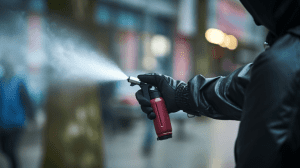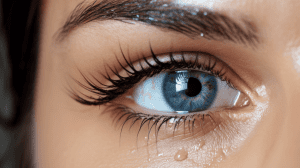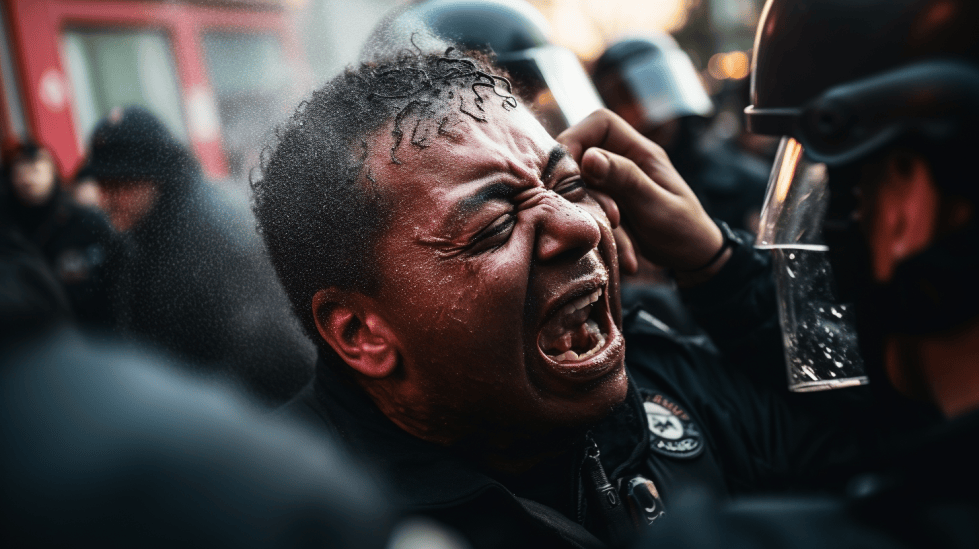How to Get Pepper Spray Out of Eyes
Pepper spray is a common self-defense tool and law enforcement weapon, but accidents can happen, and people can unintentionally get it in their eyes. It’s crucial to know how to handle such situations and safely remove the pepper spray to minimize any potential damage. This article will discuss the composition of pepper spray, its effects on the body, and the best techniques to cleanse it from your eyes.
Composed mainly of an inflammatory compound called capsaicin, pepper spray irritates the eyes and other mucous membranes when it comes in contact with them. The intense burning sensation, along with uncontrollable tearing, can cause significant discomfort and distress. Understanding how the spray interacts with the body is essential for effective decontamination, preserving your vision, and managing any possible complications.
Key Takeaways
- Pepper spray contains an inflammatory compound that causes a strong burning sensation in the eyes
- Understanding how the spray interacts with the body is crucial for effective decontamination
- Proper cleansing techniques can help minimize potential damage and alleviate the discomfort caused by pepper spray
What is Pepper Spray

Pepper spray, also known as OC spray or oleoresin capsicum spray, is a chemical irritant commonly used for personal protection and by law enforcement agencies in the United States. Its main active ingredient is derived from chili peppers, specifically the oily substance called capsaicin, which has a high concentration of Scoville heat units. This gives pepper spray its characteristic burning sensation when it comes into contact with skin or eyes.
I want to emphasize that pepper spray is highly effective as a self-defense tool and in riot control situations. When used properly, it can deter or incapacitate potential attackers or aggressive individuals, providing a safer environment for both the user and the general public. However, it’s crucial to understand that the use of pepper spray should always be accompanied by caution and proper training, as misuse can lead to serious injury or harm.
The potency of pepper spray can be measured in Scoville heat units, a scale commonly used to measure the spiciness of chili peppers. The higher the Scoville heat units, the more powerful and intense the pepper spray’s effects will be. In most cases, pepper spray causes immediate and intense irritation of the eyes, nose, and throat, making it difficult for the affected individual to see, breathe, or speak.
In conclusion, pepper spray is a useful tool for personal protection and maintaining public safety. It’s derived from chili peppers and contains capsaicin, a chemical compound responsible for its powerful irritating effects. When used responsibly and with proper training, it can be an effective means of self-defense and controlling aggressive or violent situations.
Effects of Pepper Spray
When I experience the effects of pepper spray, the immediate sensation is a burning feeling in my eyes and skin. This burning sensation is caused by capsaicin, an inflammatory compound found in pepper spray that can lead to temporary blindness, difficulty breathing, and uncontrollable tearing. In most cases, these symptoms last for about 30 minutes, but can be longer depending on the individual and the concentration of the spray.
As my eyes are exposed to pepper spray, the discomfort is quite intense. The most important thing to remember during an eye exposure is not to touch or rub the affected area, as this can increase the affected area and worsen the irritation. Blinking rapidly can also help with tear production, which may aid in flushing out the irritant.
In addition to the burning sensation and temporary blindness, I might also experience difficulty breathing due to the pepper spray affecting my respiratory tract. This can be accompanied by watery eyes, a runny nose, and even skin irritation. While these symptoms are certainly painful and uncomfortable, it’s important to note that in most cases, they are not indicative of serious injuries.
During a prolonged exposure to pepper spray, the symptoms can become more severe, causing pain and potentially damaging the eyes and respiratory system. However, it’s important to remember that these effects are normally temporary, and with proper care and treatment, they will subside.
In conclusion, the effects of pepper spray can be overwhelming and painful, but are generally not long-lasting. By staying calm and following the appropriate steps for treatment, I can minimize the discomfort and recover from the exposure more quickly.
How Pepper Spray Interacts with the Body
As someone who’s been exposed to pepper spray, I can assure you that it’s an unpleasant experience. Pepper spray contains an inflammatory compound called capsaicin, which interacts with the body in several ways. Capsaicin affects the mucous membranes in the eyes, nose, mouth, and throat, causing burning, pain, and tearing when it comes into contact with these areas.
What I didn’t know at the time… Capsaicin molecules are nonpolar, which means they don’t readily dissolve in water. That’s why simply splashing water on the affected area isn’t enough to alleviate the pain. Instead, the nonpolar molecules continue to interact with the mucous membranes, prolonging the irritation.
In addition to the mucous membranes, capsaicin impacts other parts of your body, including the skin. If you’ve been exposed to pepper spray, it’s not unusual to also experience redness, swelling, and even blisters.
When pepper spray comes into contact with your eyes, it can have some serious consequences. The immediate reaction is intense pain, followed by tearing, involuntary closing of the eyelids, and temporary blindness. It’s essential to treat the affected area promptly to minimize any long-term effects.
Overall, the interaction of pepper spray with the body can be quite distressing, but understanding how it works can help you manage the situation more effectively if it ever happens to you.
How to Cleanse Pepper Spray from Eyes

Having pepper spray in my eyes was an extremely uncomfortable experience. I found that the first thing I needed to do was to get to fresh air as soon as possible. By moving away from the area where the pepper spray was deployed, I was able to reduce my exposure source.
Once I was in an area with fresh air, I started to rinse my eyes with cold water. While doing this, I used clean fingers or a clean cloth to gently remove any visible residue from my eyes and face. I made sure to use a large amount of water because it helped dilute the effects of the pepper spray source.
I found it helpful to use a saline solution or even regular eye drops to help flush out the pepper spray from my eyes. The saline solution helped soothe my eyes and reduced the burning sensation. I also tried using a mild dish soap or baby shampoo to wash my face and the area around my eyes. This was helpful for removing any lingering residue. When using any soap, I was careful not to get it in my eyes, as it could cause more irritation.
During the cleansing process, I made sure to wear rubber gloves to avoid spreading the irritant to other parts of my body, and I had a spray bottle filled with cold water to help rinse my eyes quickly and effectively. After I had thoroughly cleansed my eyes, I applied an ice pack to reduce the swelling and discomfort.
Medical Intervention and Treatments
When pepper spray comes into contact with the eyes, it can cause immense pain and temporary blindness. While symptoms typically subside within 30 minutes, in some cases, seeking medical attention may be necessary, especially if the affected person experiences severe injuries or is at risk of permanent damage 1.
As an associate professor of anesthesiology and former research fellow at Duke University, I have encountered numerous cases of pepper spray exposure. One of the first things I recommend is immediately flushing the eyes with cool, clean water for at least 15 minutes to help dilute and remove the irritant 2. Gently washing the affected area with baby shampoo can also be beneficial, as it helps remove oil-based substances like the capsaicin found in pepper spray 3.
If the person exposed to pepper spray has pre-existing respiratory issues, such as asthma or allergies, it is crucial to monitor their breathing and help them maintain a clear airway. If necessary, assist the patient with their prescribed inhaler or seek additional medical intervention to ensure they can breathe adequately 4. In any case, it is important to get to fresh air as soon as possible, to reduce further exposure 5.
As a medical professional, my priority is to minimize the risk of complications and promote the well-being of the patient. In severe cases of pepper spray exposure, I would not hesitate to consult with an emergency physician to ensure that the best course of treatment is pursued.
By following these steps and remaining attentive to the needs of the affected individual, we can confidently address the situation, alleviate discomfort, and prevent potential long-term harm.
Footnotes
- Pepper spray: Effects, treatment, and complications – Medical News Today ↩
- Pepper Spray Burns: How to Safely Remove it from Eyes ↩
- Pepper Spray Burns: How to Safely Remove it from Eyes ↩
- Guidelines for Treating Pepper-spray/Chemical Irritants — Frontline Wellness ↩
- 10 Ways to Get Pepper Spray Out of Eyes – wikiHow ↩
Societal and Ethical Considerations
As I reflect on the use of pepper spray in recent days, I cannot help but think about its implications on society and the ethical concerns surrounding it. Pepper spray is commonly used by law enforcement officers for crowd control and personal safety. While it can be an effective tool for restraining suspects, its effects on individuals, particularly on black people in the context of police brutality, have sparked conversations on its ethicality.
As a readily-available self-defense tool, pepper spray can help protect individuals from potential dangers. However, when used indiscriminately by law enforcement, such incidents lead us to question our society’s approach to public safety. The experience of pepper spray exposure and its residual effects are particularly educational for understanding this issue.
Pepper spray has a similar effect on a person’s eyes as contact lenses, causing intense irritation, burn, and even temporary blindness. It’s crucial to rinse one’s eyes with cool water as soon as possible after exposure to minimize the severity of the symptoms. However, in situations like protests or confrontations with law enforcement, immediate access to clean water may not always be feasible.
The United Nations has documented several cases of excessive force perpetrated by officers against protesters, including the use of rubber bullets and chemical agents like pepper spray. This has prompted many to argue that alternative techniques should be employed to manage civil unrest, rather than relying on potentially harmful tactics.
In recent days, following the deaths of George Floyd and others, a growing number of people around the world have collectively called for changes in law enforcement practices, emphasizing the need to re-evaluate the use of pepper spray during protests and acts of civil disobedience.
During these tense times, I believe it is essential to consider the collateral impact of pepper spray on innocent bystanders. The residues of pepper spray can easily be transferred via clothing and with face masks becoming increasingly common, the chances of inadvertent exposure and worsened symptoms are even higher.
In conclusion, while I acknowledge the need for maintaining peace in society, I also recognize the need to re-think the use of these forceful measures. As we move forward, my hope is that dialogue on alternative law enforcement methods prioritizing personal safety and respecting human rights will become a focal point for agencies and individuals alike.
Preventing Eye Damage from Pepper Spray

Pepper spray contains capsaicin, the compound responsible for a pepper’s heat. When it comes into contact with eyes, it can cause a great deal of pain, irritation, and even temporary blindness. Inhaling the spray can also lead to breathing issues. The heat in pepper spray is derived from a natural oil found within actual pepper plants, and its intensity is much higher than what you might feel if you bit into a spicy jalapeno pepper. Because of its high concentration, it’s important to know how to protect your eyes if you ever come into contact with hot pepper spray.
I’ve learned that the best thing to do when pepper spray comes into contact with your eyes is to avoid rubbing them at all costs. Rubbing can actually spread the natural oil further, causing more discomfort and irritation. Instead, try blinking rapidly to induce tears, which can help flush out some of the irritants inside of your eyes. It’s also crucial to remove contact lenses immediately if you’re wearing them since the oil can become trapped between the lens and your eyes, prolonging the exposure and irritation.
Certain researchers, like Sven-Eric Jordt, recommend immediately covering your face with a damp cloth or paper towels if you’ve been exposed to pepper spray. The damp material may help absorb and neutralize the irritants before they have a chance to make contact with your eyes. Another helpful tip is to try breathing slowly and deeply, as this can help manage pain and reduce panic during the incident. In extreme cases, you may want to use a plastic bag to cover your head, creating a barrier between the spray and your face. However, only do this if you can still breathe comfortably.
Following these steps could help you reduce the chances of eye damage from exposure to pepper spray. It’s important to remember that acting quickly and knowing what to do can make all the difference in these situations.
Conclusion
In my experience, the best way to get pepper spray out of eyes is to follow a few important steps. First and foremost, I advise seeking fresh air and open doors to reduce further exposure to the irritant. Oleoresin capsaicin, the active ingredient in pepper spray, can cause lingering effects in the air, so it’s crucial to quickly move to a well-ventilated area.
I would also recommend blinking rapidly to stimulate the production of tears, which can help flush out some of the pepper spray from the eyes. This natural defense mechanism is our body’s primary response to foreign substances in the eye and can help initiate the recovery process.
When dealing with serious exposure to pepper spray, it’s essential to know what to expect. Oleoresin capsaicin can cause burning, pain, and tears upon contact with the eyes, but the symptoms will usually resolve in 30 minutes to an hour. To speed up the recovery process, avoid rubbing the eyes and instead rinse them with cool water for at least 15-20 minutes. Keeping a clear, knowledgeable, and neutral mindset during this process can make a significant difference in managing the situation.
Following these steps should help mitigate the effects of pepper spray exposure and provide relief to the affected eyes. Remember to stay calm and focused during the process, as this can significantly influence your ability to handle the situation effectively.
Frequently Asked Questions
What is the best way to remove pepper spray from eyes?
The best way to remove pepper spray from your eyes is to flush them with cool, clean water for at least 15 minutes. Blink frequently to help your eyes naturally rinse out the irritants. Additionally, using baby shampoo can be helpful in removing the oil-based substance from your eyes. Be sure to ask someone to assist you during this process. source
How long does it take for the effects of pepper spray to subside in eyes?
The effects of pepper spray can vary depending on the individual and the concentration of the spray. Generally, the intense irritation and discomfort may subside within 30 minutes to 2 hours. However, some residual effects may persist for up to 24 hours.
Are there any effective home remedies for pepper spray in eyes?
Aside from using cool water to flush your eyes and baby shampoo to remove the oil-based substance, there are no proven home remedies to treat the effects of pepper spray. It is essential to avoid rubbing your eyes and stick to flushing them with water as most other home remedies may worsen the situation.
What should I avoid doing when trying to alleviate pepper spray from my eyes?
Do not touch or rub your eyes, as this can spread the irritant and make the pain worse. It is also essential to avoid wearing contact lenses, as they can trap the oil from the pepper spray, making the irritation even more severe. source
Can milk be used as a remedy for pepper spray in eyes?
There is a popular belief that milk can help alleviate the effects of pepper spray, but there is no scientific evidence to support this claim. In some cases, using milk might even make the situation worse due to the possible contamination and reaction with the pepper spray. It is best to stick to water and baby shampoo when trying to alleviate pepper spray from your eyes.
What precautions should be taken when cleaning pepper spray off the face?
When cleaning pepper spray off your face, be sure to use cool water and baby shampoo. Gently blot your face with a clean towel without rubbing. Keep your eyes closed to minimize irritation. Additionally, wear gloves if available, to avoid transferring the irritant to other parts of your body.








